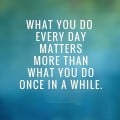What Should You Do When You Begin a New Job?

It’s a New Dawn. It’s a New Day. It’s a New Life. And You Feel Good.
Congratulations! You’ve landed that new job.
For some, it may be new to their first job. For many of us, given the job market over the last five years or so, it’s the next phase of our career. And whether you’re a new graduate, a veteran, or a seasoned professional, you have to remember that probably you’ll be in a place full of strangers who know almost nothing about you.
It's like that first day of school all over again. There are new people, new rules, and new ways of behaving.
Everyone gets to be “new” at least once. And if you’re new to the workforce, you should know that the average person changes careers at least three times in his or her life. “New” is a matter of perspective.
So, what do you do? If you’re lucky enough to have landed full time, permanent employment position (non-contract work), you’re probably going to be around for quite a long time. It is important you act properly and remember that new careers, like a new relationship, have their own set of rules.
Just to let you know that I know what I’m talking about and that this isn’t my first rodeo, I’ve had to start over a few times. After being with one Fortune 100 company for fifteen years and going through a reduction in force, I did contract work for eight years. Each contract was a new opportunity to be an asset and to make friends and contacts for a finite period of time. Each new start was exciting and each finish was the end of a chapter in my life.
While I know a newbie is excited to collect a new paycheck and make that all important business contribution, you might need to pace yourself a bit. Your dazzling office, linguistic, and technical skills need to be discovered rather than shown off at this point. Like a hot bath, it’s best to ease yourself into the water than make a large splashy mess.
Curb your enthusiasm.
Also, if you’re the type of person who likes to be a “rebel” or “party-girl”, table that behavior indefinitely or you’ll be unmasked faster than Martin Landau at the end of a Mission: Impossible episode.
Here are things that you absolutely must do to make your new career start as painless as possible.

Dress Appropriately
The new trend with businesses is to dress in “Business Dress Casual”. Learn what that means.
Most of the time, it means no jeans, no sneakers, no T-shirts. To be safe, I would upgrade to “suit optional, tie optional, jacket optional” or, when you’re ready to push the envelope, “khaki pants, button down dress shirt, shoes”.
This is for corporate dress casual. Obviously, if you’re a blue collar worker who is required to wear either a uniform or appropriate dress for the environment, wear what they tell you to.
You are to dress to impress. You are not there to show everyone how you dress at home.
Each company has an image to maintain. When clients come to your office, there's a level of decorum and a level of professionalism. Avoid wearing that Black Sabbath concert tee shirt, ripped jeans (or ripped anything), or what you’d wear to a local pub.
Remember, the people in this new company don’t know you yet. It’s best that they get the right impression of you. Keep things professional and dress in a manner that doesn’t make the hiring manager regret his decision.
What attracts you to a new job?
Arrive on time
Very much like going on an interview, it is critical to be punctual. One of the best pieces of advice regarding punctuality came when I was in the Reserved Officers Training Corp. “If you can’t be on time, be early.”
Much like having a firm handshake for the “halo effect”, you should avoid making a poor impression by being late on your first day. Punctuality shows an employer that you can plan and carry through with your plans.
While this should be a no brainer, it is critical to remember because you’ll need to know how long it’s going to take you to get to your office during a normal commute day. Chances are, you’ll begin working the first Monday after you’ve been hired. That being said, you’ll need to overestimate your ETA and account for traffic.
Always allow for extra time.
If you need to buy bus tickets or train tickets, buy them in advance. There is nothing worse than missing a bus or train because you’re in line at a ticket counter.
If you’re driving to work, fill your gas tank. If there’s enough time between your hiring day and your start date, take your car to the mechanic and get a tune up. After all, you’re going to be using your car on a regular basis now. Take “car trouble” out of the equation. I remember one interview on a cold December morning that I had scheduled in New York and I couldn’t start my car. Fortunately, I was able to use my wife’s. However, I remember panicking that morning.
Do's and Don't's
Do's
| Don't's
| Importance
|
|---|---|---|
Be on time
| Leave work early
| Moderate
|
Be professional
| Use inappropriate language
| Critical
|
Study up on your skills
| Surf the Internet
| Moderate to Critical
|
Meet your coworkers
| Make personal calls
| Moderate
|
Learn about your company
| Update your Facebook status
| Critical
|
Dress "Business Casual"
| Wear jeans and sneakers
| Critical
|
You are there to learn
You may be a seasoned professional with years of experience under your belt, but every company has their own way of doing things. You need to know their ropes before you go about making your own.
This is especially true if you’re changing industries. My experience with this goes to when I came from working within a brokerage firm and then went to work doing a similar role within a pharmaceutical firm. Things that were somewhat lax within the financial industry are strictly regulated within the pharmaceutical industry. My first two weeks of working at that latter job involved eighty hours of online training regarding FDA rules and procedures as well as the criticality of cyber security on the job.
I needed to know how and why things were done before I went about doing things my own way. Had I not focused on their procedures I may have made critical mistakes that would have cost me my job or my contract.
Quote
“It is better to keep your mouth closed and let people think you are a fool than to open it and remove all doubt.”
- Mark Twain
Silence is Golden
Mark Twain had once said, “It is better to keep your mouth closed and let people think you are a fool than to open it and remove all doubt.”
That rule holds firm today. For the most part, you should be listening. If someone addresses you directly with a question, answer them. However, you should do your best to squash the urge to chime in with your opinion regarding their business. Remember, in these first days, you will be judged by your first impression. Be thought of as being thoughtful.
This also goes for the language you use. It is not professional to swear on the job. That includes swearing when you bang your thumb in a desk drawer. In everything you say and do from the hours of nine to five (and in some cases beyond that), you represent your work place.
If the language is loose within your department, resist the temptation to peer pressure. Until you get the feel for whom your coworkers are and the environment of the workplace, speak as if you were talking to your grandmother.
This includes email, texting, and phone conversations.

You are on THEIR clock
The term “employee” literally means “to be used”. If your hours are 9: AM to 5: PM, you are on their time. They are paying you for your time. That being the case, you are only to do things that the company would have you do.
That means the following:
- No personal calls
- No Facebook
- No Tweeting
- No blogging
- No surfing the Internet (unless it’s part of your job)
- No personal emailing
- No commenting on Internet boards
- No cellphone pictures in the office
And, above everything else, do not use your company email account for personal business. People can be fired for that.
If you really have a need to update your Facebook status, make a personal call, tweet, or make a personal email, do it from your smartphone during your lunch hour. Keep your comments general and NEVER bad mouth your new workplace while using its company name. Those things are searchable and they can cost you your new job.
You are on their clock. Your time is theirs. They are paying for it.
Things to consider...
- Depending on your economic situation, it is sometimes better to have time than money.
- Benefits have value and should be considered in your acceptance or rejection of a new job.
- The distance you have to commute to your job is a definite factor in your salary computations. If you spend half your day on the road, you need to ask yourself if you're working to live or living to work.
- It's important to get along with your co-workers. Eight plus hours of your day will be spend with them - which is longer than most people spend with their family.
Look Busy and Be Productive
You are there to work.
If your direct manager has a job or assignment for you, do it. Understand what you can. If you have any critical questions, ask them. However, don’t ask stupid questions. The presumption is that you have the qualifications for the job you’re doing. If they tell you to take some data, make an Excel spreadsheet, and make some graphs, do that.
When you’re done, let them know. They may wish you to do something else.
However, chances are that they won’t start you doing anything mission critical. They’ll probably be introducing you to people you’re going to work with and who the people are that you’ll need for specific resources.
If they don’t give you anything, brush up on the skills they’re paying you for. If you’re doing stuff involving SQL databases, brush up on your SQL querying. If you haven’t used your JavaScript skills in a while, brush up on that.
If you aren’t doing your very best, be prepared to do your very best.
Final Words
Nothing I’ve said here is new. All of it should be common sense.
Scott Adams, author of Dilbert and The Dilbert Principle, said, “Companies use a lot of energy trying to increase employee satisfaction. That's very nice of them. But let's face it — work sucks. If people liked work they'd do it for free.”
It’s easy for me to sit here and say that in today’s market, you should be happy to have a job in a recovering economy. I know that there are certain liberties that I’m giving up during my work hours in order to continue to be employed. I know that my time on Facebook is going to go down, I also know that there are things I’m going to need to do on my privacy settings to insure that anything I’ve said in the past should not come back to haunt me.
As much as I advocate freedom of speech and freedom of expression, I also advise young people who are new to the work force that while people are free to do many of these things, you are also free to live in a cardboard box and be jobless. You should always be cognizant that the price for being employed is that you represent your employer. So, if you’re arrested for doing illegal drugs and that ends up in the news, don’t be surprised that it will also cost you your job.
Until you find your groove within the company, you should take it slow, do what you have to do, be a team player, and above all, don’t be an asshole. Remember what it was like for you on your first day of school. There were a lot of new faces, new rules, and new ways to behave. Starting your career at a new company is not that much different. Eventually, you’ll make friends, find your niche, and become an asset.
Until then, your job is to do your job and be a professional while doing it. Obey the rules, be polite, and learn the ropes. Once you’ve done that and establish yourself, the world will be your mollusk.
This content is accurate and true to the best of the author’s knowledge and is not meant to substitute for formal and individualized advice from a qualified professional.
© 2014 Christopher Peruzzi







